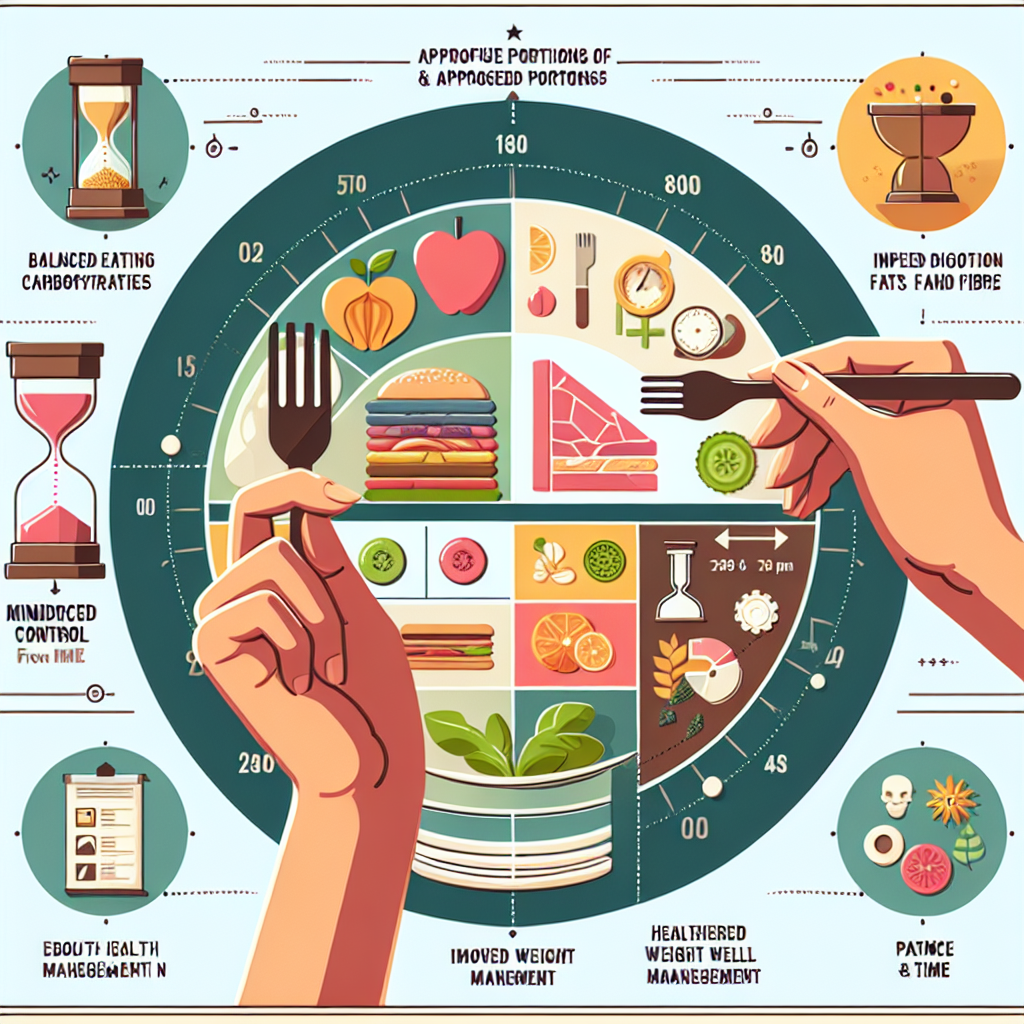Health Benefits of Mindful Eating and Portion Control

Discover the health benefits of mindful eating and portion control! Improve your overall health, manage your weight, and enhance your relationship with food. Start your journey towards a healthier lifestyle today. Click here to learn more.
Exploring the Health Benefits of Mindful Eating
Mindful eating and portion control are two dietary practices that have gained significant attention in recent years. These practices are not just about weight loss; they offer a myriad of health benefits that extend beyond the scale.
Mindful eating is a practice that involves paying full attention to the experience of eating and drinking, both inside and outside the body. It involves noticing the colors, smells, flavors, and textures of your food; chewing slowly; getting rid of distractions; and learning to cope with guilt and anxiety about food. This practice is about more than just eating; it’s about understanding your motivations for eating and developing a new relationship with food.
On the other hand, portion control is about understanding how much a serving size of food is and how many calories or how much food energy a serving contains. It’s about realizing that your portion sizes can be larger or smaller than the recommended serving size, and adjusting them accordingly to meet your individual health and nutrition needs.
The health benefits of mindful eating and portion control are numerous. Firstly, these practices can help prevent overeating and promote weight loss. When you eat mindfully, you pay attention to your hunger and fullness cues, which can help you avoid eating more than you need. Similarly, portion control can help you manage your calorie intake, which is crucial for weight loss.
Secondly, mindful eating and portion control can improve your digestion. Eating slowly and chewing your food thoroughly can help your body better digest your food and absorb its nutrients. It can also prevent digestive problems such as bloating, gas, and indigestion.
Thirdly, these practices can help improve your relationship with food. Mindful eating can help you enjoy your food more and appreciate the nourishment it provides. It can also help you recognize and cope with your emotional and psychological responses to food. Portion control, on the other hand, can help you feel more in control of your eating and less guilty about your food choices.
Fourthly, mindful eating and portion control can help prevent chronic diseases. Overeating and obesity are risk factors for many chronic diseases, including heart disease, diabetes, and certain types of cancer. By helping you manage your weight and improve your diet, these practices can help reduce your risk of these diseases.
Lastly, these practices can improve your mental health. Mindful eating can reduce stress and anxiety by helping you stay present and focused. It can also improve your self-esteem and body image by helping you develop a healthier relationship with food. Portion control can also contribute to better mental health by reducing feelings of guilt and shame associated with overeating.
In conclusion, mindful eating and portion control are not just about losing weight; they’re about improving your overall health and well-being. By helping you eat less and enjoy your food more, these practices can improve your physical, emotional, and mental health. So, the next time you sit down to eat, try to do so mindfully and pay attention to your portion sizes. Your body and mind will thank you.
Understanding Portion Control: A Key to Optimal Health

Understanding portion control is a key to optimal health, and it is a concept that is often overlooked in our fast-paced, convenience-oriented society. The practice of mindful eating, which includes paying attention to portion sizes, can have a significant impact on our overall health and well-being.
Mindful eating is a practice that involves paying full attention to the experience of eating and drinking, both inside and outside the body. It involves noticing the colors, smells, flavors, and textures of your food; chewing slowly; getting rid of distractions; and learning to cope with guilt and anxiety about food. When we eat mindfully, we are also more aware of our body’s hunger and satiety cues, making it easier to recognize when we have had enough to eat.
Portion control, a key component of mindful eating, is the practice of determining how much of a particular food or drink is consumed. Portion control is important for weight management because it allows you to have a balanced diet while still enjoying your favorite foods. Without portion control, it’s easy to eat more than the body needs, leading to weight gain and associated health problems.
The health benefits of mindful eating and portion control are numerous. First and foremost, these practices can help prevent overeating and promote weight loss. When we eat mindfully, we are more likely to eat less and enjoy our food more. This can lead to a natural reduction in calorie intake, without the need for restrictive dieting.
Moreover, mindful eating and portion control can help improve digestion. Eating slowly and chewing thoroughly can aid digestion and increase the absorption of nutrients. It also allows our body enough time to signal to our brain that we are full, preventing overeating.
Additionally, these practices can help reduce stress and improve mental health. Eating mindfully encourages us to slow down and enjoy the present moment, which can have a calming effect and reduce stress levels. It can also help us develop a healthier relationship with food, as we learn to listen to our body’s cues rather than eating out of habit or in response to emotional triggers.
Furthermore, mindful eating and portion control can help manage or prevent chronic diseases such as diabetes, heart disease, and certain types of cancer. Overeating and obesity are risk factors for these diseases, so managing portion sizes can be an effective strategy for prevention and control.
In conclusion, mindful eating and portion control are simple yet powerful practices that can significantly improve our health and well-being. They encourage us to slow down, enjoy our food, and listen to our body’s cues. They can help prevent overeating, promote weight loss, improve digestion, reduce stress, and manage or prevent chronic diseases. By incorporating these practices into our daily lives, we can take a big step towards optimal health.
Combining Mindful Eating and Portion Control for Enhanced Well-being
Mindful eating and portion control are two powerful tools that can significantly enhance your overall well-being. When combined, they can help you maintain a healthy weight, reduce the risk of chronic diseases, and improve your relationship with food.
Mindful eating is a practice that involves paying full attention to the experience of eating and drinking, both inside and outside the body. It encourages you to pay attention to the colors, smells, textures, flavors, temperatures, and even the sounds of your food as you chew. This practice can help you savor each bite, appreciate your food, and develop a better understanding of your hunger and fullness cues.
On the other hand, portion control involves understanding how much a serving size of food is and how many calories or how much food energy a serving contains. It’s about eating a balanced diet and not overeating, even when it comes to healthy foods.
When you combine mindful eating with portion control, you create a powerful synergy that can lead to enhanced well-being. This combination can help you avoid overeating, which is a common problem in today’s society where large portion sizes are the norm. Overeating can lead to weight gain and increase the risk of chronic diseases such as heart disease, diabetes, and certain types of cancer.
Mindful eating can help you become more aware of your eating habits and the types of food you eat. It can help you recognize when you’re eating out of boredom, stress, or other emotions rather than hunger. This awareness can help you make healthier food choices and reduce emotional eating.
Portion control, on the other hand, can help you understand how much food is enough. It can help you avoid eating large portions just because they’re available. By understanding serving sizes and the nutritional content of your food, you can make informed decisions about what and how much to eat.
When you combine these two practices, you can enjoy your food more and feel satisfied with less. You can learn to savor each bite and appreciate the nourishment your food provides. You can also learn to listen to your body’s hunger and fullness cues, which can help you avoid overeating and under-eating.
Moreover, mindful eating and portion control can help improve your relationship with food. Instead of viewing food as something to be feared or controlled, you can learn to see it as a source of nourishment and pleasure. You can learn to enjoy your meals without guilt or anxiety, which can lead to a healthier and more balanced relationship with food.
In conclusion, mindful eating and portion control are powerful tools for enhancing your well-being. They can help you maintain a healthy weight, reduce the risk of chronic diseases, and improve your relationship with food. By practicing these techniques, you can enjoy your food more, feel satisfied with less, and develop a healthier and more balanced relationship with food. So why not give it a try? Start practicing mindful eating and portion control today and experience the health benefits for yourself.